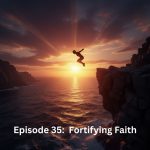Fortifying Faith (Blog 35)

FORTIFYING FAITH
#1: Think with Faith
Faith is defined as ‘complete trust and belief with strong conviction.’ It can be applied to something as trivial as a trusty tool to something as monumental as “the arc of the moral universe,” as Martin Luther King, Jr. put it. But to some, faith is a fantasy. Whether it’s faith in God, the Universe, a political leader, or even a friend or family member, anyone can seemingly let us down by not meeting our expectations. However, faith is an interactive phenomenon that invites us to participate in the positive evolution of our circumstances. At first glance, this participation sounds like a lot of work. But much of the work that makes faith operational is not so much about doing something as it is about undoing something. That something is our default reaction of being negative in the face of disappointment. To avoid this downward spiral of negativity, which most of us have experienced, it’s helpful to contemplate the ancient Arabic proverb, “What’s meant for you will never miss you, and what misses you was never meant for you.” Interestingly, you don’t have to believe in a higher power for this sentiment to be useful in your life. Yes, the proverb does have a spiritual origin. But at its core, it’s really just inviting you to be patient with life… to be open to things turning out better than you had planned… and to welcome an expansion of awareness that offers greater clarity regarding why things happen as they do.
Thinking with faith is an inherently optimistic mindset that leads to more happiness and lightness of heart. It’s reminiscent of the folktale about a boy who was given a pile of manure as a gag gift on his birthday. Overcome with joy, the boy jumped into the manure exclaiming, “There must be a pony in here somewhere!”
#2: Act with Faith
In addition to thinking with faith, it also serves us to act with faith. A second Arabic proverb illustrates this concept perfectly: “Trust in Allah, but remember to tie up your camel.” Core to the idea of “trusting in Allah” (or simply a higher order in the Universe) is a refusal to believe in happenstance. When you act with faith, you trust that there’s a bigger process at play, even if you can’t yet perceive or completely understand that process. That trust gives you strength and courage to face whatever life brings. So, when you metaphorically “tie up your camel,” you simply do so out of prudence and can then be at peace - regardless of outcomes - knowing that you’ve done your part. Your other option is to act without faith while going to paranoid and extreme measures. And despite those extreme measures, you will still be in a state of angst because you haven’t let go of your fear by embracing faith. The aim is to marry faithful, optimistic thinking with faithful, balanced action. That is the ideal formula for both effectiveness in your life and peace in your mind.
#3: Reflect with Faith
To balance ourselves in a state of faithful equilibrium between how we think and how we act, steady practice of self-reflection is required. And any practice of self-reflection involves self-responsibility. For example, choose not to feel victimized by a health challenge, but rather seek to see your part in it and consider lifestyle changes that could bring you out of it. Lament less about an unpleasant work environment, and strategize more about how to find something new. Complain less about your relationship dramas, and strive more to comprehend what life is trying to teach you by way of those dramas and how to rise above them.
By reflecting on our difficulties in these ways, we’ll find that we subconsciously self-sabotage much more than we ever thought. And the deeper we reflect, the more we’ll discover how nuanced that self-sabotage can be. Things we once regarded as harmless are analyzed through a more powerful lens. For instance, as a culture, we’ve developed an unsettling numbness to violence. A large percentage of today’s films, shows, and video games glorify killing and romanticize war. Repeatedly exposing ourselves to this extremely violent entertainment plants images in our psyche that eventually seep into our daydreams (and quite often, our nightmares). And like a steady diet of digital junk food, these images will cause psychological indigestion and manifest within our lives in unhealthy ways. Nothing is intrinsically external. To calm the chaos in our outer life, we must first calm the chaos in our inner life. A constant stream of disturbing images and dark fantasies will inevitably make your inner and outer chaos more chaotic.
Still, though… the world is intelligently designed as a remedial system of trial and error that encourages us to choose higher (often through self-created hardship). But our journey through this world is made much easier when we consider the higher perspective that whatever shows up is only part of a beautiful mosaic so large it stretches beyond our ability to see it all. Our experience of life vastly improves when we trust that reasons for outcomes exist beyond our own ability to reason. We can then loosen our grip on the idea that bad things can happen and consider that “bad things” are just things for which we don’t have an immediate explanation. It may take a few lifetimes, but we’ll all eventually realize that faith isn’t an exercise in believing something… it’s an exercise in becoming aware of something.
( Feel free to ask questions or post comments on this website’s social media links )


